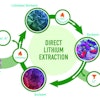A California scientific panel recommended that the state add bisphenol-A to its list of harmful chemicals that must be disclosed by companies.
The Developmental and Reproductive Toxicant Identification Committee — a group of scientists appointed by the governor — on Thursday determined that BPA, a common ingredient in plastics and canned goods, should qualify under Proposition 65.
The 1986 law requires the state to list chemicals known to cause cancer or reproductive problems and requires companies using those chemicals to notify the public. The BPA labeling requirement would specify that the compound could cause reproductive harm in women.
The chemical industry slammed the decision and said it contradicts both the scientific record and input from federal regulators.
Joseph Perrone, chief scientist for the nonprofit Center for Accountability in Science, said California regulators stirred up "more needless fear about safe products."
The American Chemistry Council sued the state in 2013 over its efforts to add BPA to the Prop 65 list; that litigation is still pending. Earlier this year, the industry group launched a spirited defense of the chemical, which noted that U.S. and European regulators found that it posed "no health risk to consumers of any age group."
Environmental groups and public health advocates, however, pointed to a range of scientific studies linking BPA to physical and behavioral maladies. California and 12 other states previously took steps to limit its inclusion in baby bottles, cups or other consumer products.
"The state's experts looked past industry attempts to manufacture doubt, and followed the extensive literature showing BPA's harmful effects," wrote Avinash Kar, an attorney with the Natural Resources Defense Council.
The DART committee ruling will proceed to a second scientific examination to determine at what level the chemical becomes harmful. A disclosure requirement would not take effect for at least another year — if at all — according to California environmental officials.
CA Panel Recommends Warning Labels For BPA
A panel recommended that the state add BPA to its list of harmful chemicals.
May 14, 2015
Latest in Energy
Biden Announces $7 billion in Federal Solar Power Grants
April 22, 2024






















